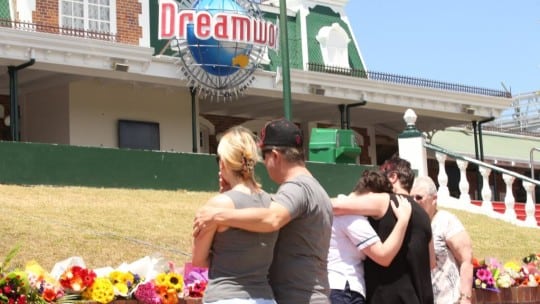
There are so many lessons for brands and brand communicators to learn from the awful mishap in Australia late last month. It vies with Wells Fargo as one of the poorest performances during a crisis, ensuring its dubious enshrinement in PR textbooks and classrooms for years to come.
The basic facts: Four people are dead after inflatable rafts collided at one of the country’s most popular theme parks water ride, Thunder River Rapids. A young boy and girl escaped miraculously. The Oct. 24 scene was gruesome.
Foster a culture where employees are unafraid to speak their minds about potential issues. In an article published in PR News Pro in April, Deborah Hileman, president/CEO, Institute for Crisis Management, wrote, “Crisis management consultants often advise clients to implement an early-warning system to surface issues early enough to prevent or mitigate them before significant damage occurs. As it turns out, communications and culture are key parts of such a warning system.”
As Torod Neptune VP, corporate communications, Verizon, noted during a recent PR News Crisis Management Workshop in New York, as a communicator “you already know where 90% of the crises” that will touch your business are. “If I ask you to name the three areas where you think there will be a crisis at your company I’m sure you’d be able to name them,” he added.
While the reports are unconfirmed, media in Australia has published stories saying that park employees were aware of issues with Thunder River Rapids. More than that, reports by park visitors, again unconfirmed, are that the ride was closed at several points during the day the deaths occurred. Another unconfirmed report has the board of Ardent Leisure, the park’s high-profile corporate owner, suppressing reports that the ride and others needed extensive repairs.
More immediate lessons have emerged, however.
Always have a crisis plan. While the death of four park patrons is awful, Ardent Leisure’s reaction to the terrible incident has ballooned it into a full-blown crisis. There have not been any deaths at an Australian theme park for nearly 40 years. Open since 1981, Dreamworld, the park where the deaths occurred last month, has had a pristine record. As a result, you could argue that owner Ardent Leisure didn’t need a crisis plan, right? Wrong. Crises, like certain diseases, are equal opportunity attackers—they hit large companies and small ones, brands that are iconic and those that are barely known.
Not to worry, most companies have crisis plans in place. Mmm, not if you believe surveys that Hileman has done or one we did earlier this year along with Nasdaq PR Services. Both Hileman and PR News found about half those surveyed lacked crisis plans. Moreover, the Nasdaq-PR News survey found about 60% of companies fail to practice crisis scenarios periodically.
A prominent Australian business journalist, Glenda Korporaal, writing in The Australian, Oct. 28, summed up things well: Ardent Leisure’s handling of the Dreamworld crisis should be a wake-up call for chief executives and chairs of any major company to have crisis plans in place.
Did Ardent Leisure have a crisis plan? We don’t know, but if it did, it likely needs revisions. Both its high-profile CEO Deborah Thomas and its chairman Neil Balnaves were late to the scene. Reports, again unconfirmed, had Thomas locked in a room at Dreamworld with her mobile phone switched off; Balnaves officially was too distraught to speak publicly. While the company issued an appropriately toned apology relatively quickly, it lacked the voices of Thomas or Balnaves. Its apology shares a total lack of senior voices with Wells Fargo's initial statement of regret, which left some critics wanting more.
The park was closed soon after the incident so the police could begin an investigation. As we write this essay, it has yet to reopen. Ardent Leisure's share price has been ravaged. (Speaking of being ravaged, an article in Fortune argues that people are far more willing to blame female CEOs than male CEOs for crises. The online release of the article coincided with Thomas's flogging in the media.)
Just three days after the deaths occurred, Ardent Leisure was scheduled to hold a board meeting. While some in Australia argued the board should have postponed out of respect for the victims, it met. The results were even more damaging than the decision to hold the meeting: Thomas was awarded an $800,000 performance bonus. After heavy prodding from the media, Thomas said she’d donate the cash portion of it, about $200,000, to the Red Cross, which has been counseling survivors. Balnaves said he’s going to retire, but will be available to the board until the crisis is settled.
Shortly after the board meeting Thomas faced the press. She noted the company had been in contact with families of the four victims. Oops. Here’s a transcript of what happened next:
Deborah Thomas: “We’ve reached out to the families, we’ve finally made contact with the Dorsett family and we are talking with them today about how we may assist. We are doing this through the police liaison office.”
Melinda Nucifora (a reporter): “The Dorsett family are actually watching this press conference at the moment and are apparently furious at suggestions that support had been offered to them. They say that they've had no direct contact whatsoever; no one's even reached out to them.”
Thomas: “We didn’t call the Dorsett family directly because we didn’t know how to contact them so we have been to, um, the police liaison officer.”
Nucifora: “I have her mobile number. Will you call them now?”
Thomas: “I will not call her now in front of the media scrum but I am very happy to call her very soon after this meeting.”
There are at least two lessons here. First: Get your facts straight before you present them in public. The second lesson? It’s one we all learned not in PR, but in grade school, hopefully: Tell the truth.
Follow Seth: @skarenstein
